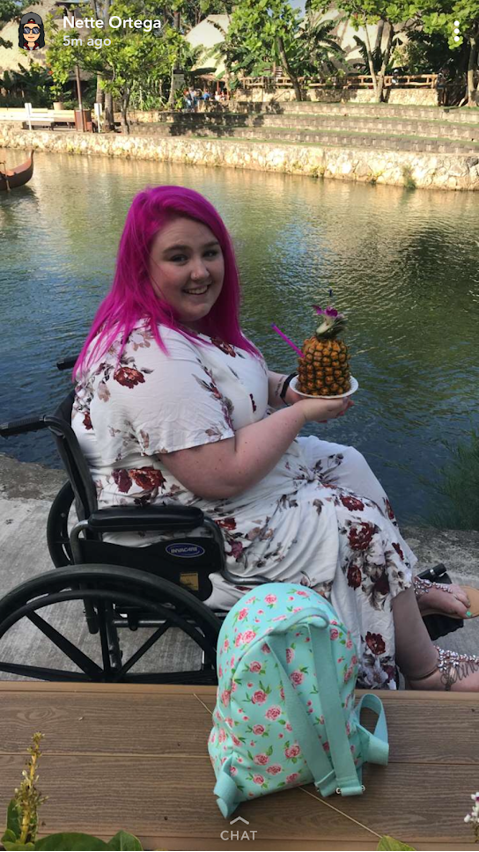
Choose Your Language:
Posted by: The Sumaira Foundation in NMO, Patient, Voices of NMO

April Fools’ Day jokes are supposed to be funny. However, the one my parents thought I was playing two years ago, was most definitely not. I’m not pulling your leg either when I tell you, on April 1, 2016, I woke up completely blind in my left eye.
Let me pause for a moment and add that I had never had any major medical problems. I also had just spontaneously left the state and my parents had no clue. I was alone and scared.
My first thought was, “it’s obviously an eye problem”. I scheduled the soonest appointment at the Vision Center at Walmart and made my way there. Sitting patiently in the waiting room, I still hadn’t said anything to my parents and the person I had gone away with, was mad I ruined the day and did not offer much help. The optometrist did about four or five tests and then regrettably told me that there was structurally nothing wrong with my eye therefore, it had to be neurological and I needed to go to the emergency room immediately.
Fast forward about an hour and a half. I’m at an ER and still haven’t said anything to my parents. I’m 25 years old, I’ve never been sick, never been admitted to the hospital and here I am, laying in a hospital bed in Arizona, half blind. The usual questions were asked: allergies, family history, any other symptoms. We did an EKG and a CT scan and even though it’s a good thing they all came back normal, it unfortunately meant we had no answers.
A neurologist eventually came in and wanted to preform a spinal tap. For those of you who aren’t familiar with medical terminology, a spinal tap is a test in which a 12-inch needle is placed in between your spine to draw out cerebral spinal fluid. I was terrified. I cracked and called my mom. Couldn’t this all wait for when I got home?
Well, the answer was no. We can skip over my mom nearly having a heart attack and telling me it had to be done. We needed answers. After the spinal tap, I was told I had an opening pressure of 247 mm (normal range is between 70 -180mm). At this point, I was diagnosed with Pseudo Tumor Ceribri (that’s when your brain mistakes pressure for a false tumor). I was subsequently sent home with glaucoma medication.
I needed to see a neurologist and an optometrist for follow-up care. I found the ONLY Neuro-Ophthalmologist in Utah and made an appointment. A few days later, I still had no eyesight and multiple tests were being done on my eyes. Diseases I had never even heard of were being thrown at me only to be ruled out. One after another. Dr. Moran suspected it was probably optic neuritis (pressure on my optic nerve from stress and causing blindness). I was given three days of IV Solumedrol (steroids) and was told everything should be good to go.
On April 18 2016, I returned to see the doctor and had additional tests done. He invited five students (since it was a teaching hospital) and asked what they thought. Only one spoke up and said multiple sclerosis. I’d heard of it. I knew it was life-changing, but I had no idea what it meant for me. But that’s okay! Dr. Moran shot it down and I was sent to the hospital for a chest X-ray, blood test and an MRI of the brain and spine.
On my way home, the phone rang. I answered hesitating as we pulled into the driveway and that’s when I heard it,
I started bawling. My chest was tight. I could barely breath. I had to hand the phone to my mom because after hearing those words, I couldn’t hear anything else. I called my dad immediately and through tears and screaming, I told him I had MS and was being admitted to the hospital.
I’d love to be able to say that I got through my hospital stay, the medication was helpful, my vision came back, and I live my same life even with MS. WRONG.
My first stay at the hospital was 15 days. During this time, lesions were discovered in my brain, optic nerve and my spine. They found MS bands in my CSF fluid. I received seven days of IV Solumedrol (which I had a bad reaction to) and eight days of plasmapheresis (a long catheter is inserted into the main heart ventricle through your neck, pulls your blood out, cleans it, replaces the plasma and puts it back in your body).
15 days passed and I still couldn’t see. I was discharged with the hope that my vision would come back soon. It finally did two weeks later and I tried to get back into my normal groove.
Six weeks after my first hospital admission, I woke up with no vision in my right eye and no color in my left. I was admitted to hospital AGAIN for IV Solumedrol and plasmapheresis. That stay was 17 days and I left with no eyesight. Eventually, the color and vision come back and at that point, I had established a relationship with my neurologist who put me on a monthly infusion of Tysabri regardless of my high JCV count.
Six more weeks go by and I find myself admitted yet again for vision loss. But this time, with a numb left leg and mobility issues. Then, some other diseases were thrown around. I went through the same treatment plan: IV Solumedrol and followed by plasmapheresis. However, this time I left the hospital with a lot more then MS and some neck scars.

During this admittance, the nurses and doctors couldn’t get my veins to withstand an IV. After 12 hours of multiple attempts, I was finally given a PICC line. More tests were done and on September 18, 2016, I was finally diagnosed with neuromyelitis optica. Upon discharge, a portacath was placed. To avoid all this IV drama, I met with my neurologist to devise a new game plan and that’s where I’m still at.
Since my NMO diagnosis, my life has changed more than I ever thought would be possible. If you were to look at my medical chart, my diagnoses are MS and NMO. While most don’t find this possible, I have way too many symptoms that one disease has and not the other and vice versa. There are MS bands in my CSF fluid. I have around 37 small brain lesions and very large lesions going down my spine which affect the way I walk and move. I have since lost feeling in my hands, the ability to hear in my left ear, the ability to work, drive, and live a “normal” life. I have scars all over my chest, a portacath that sticks out, and I have to do infusions every six months, 4x / month for 6 hours. I could go on and on about the negative, but the positive is much more fun to talk about.
I married my best friend June 2, 2018 and I have never been happier. I started a chronic illness subscription box, Sending Spoons, that has grown immensely. I have become very involved in the online disabled community and have learned to love my new life even though some days I am still having trouble mourning my old life.
Please visit www.sending-spoons.com or follow me along on Instagram or Facebook @sendingspoons_.